Close UP
Tokyo YMCA Multicultural Space ▽ - Sankaku - ~Creating a safe place for children and young people from various cultural backgrounds to be themselves and feel at ease.~
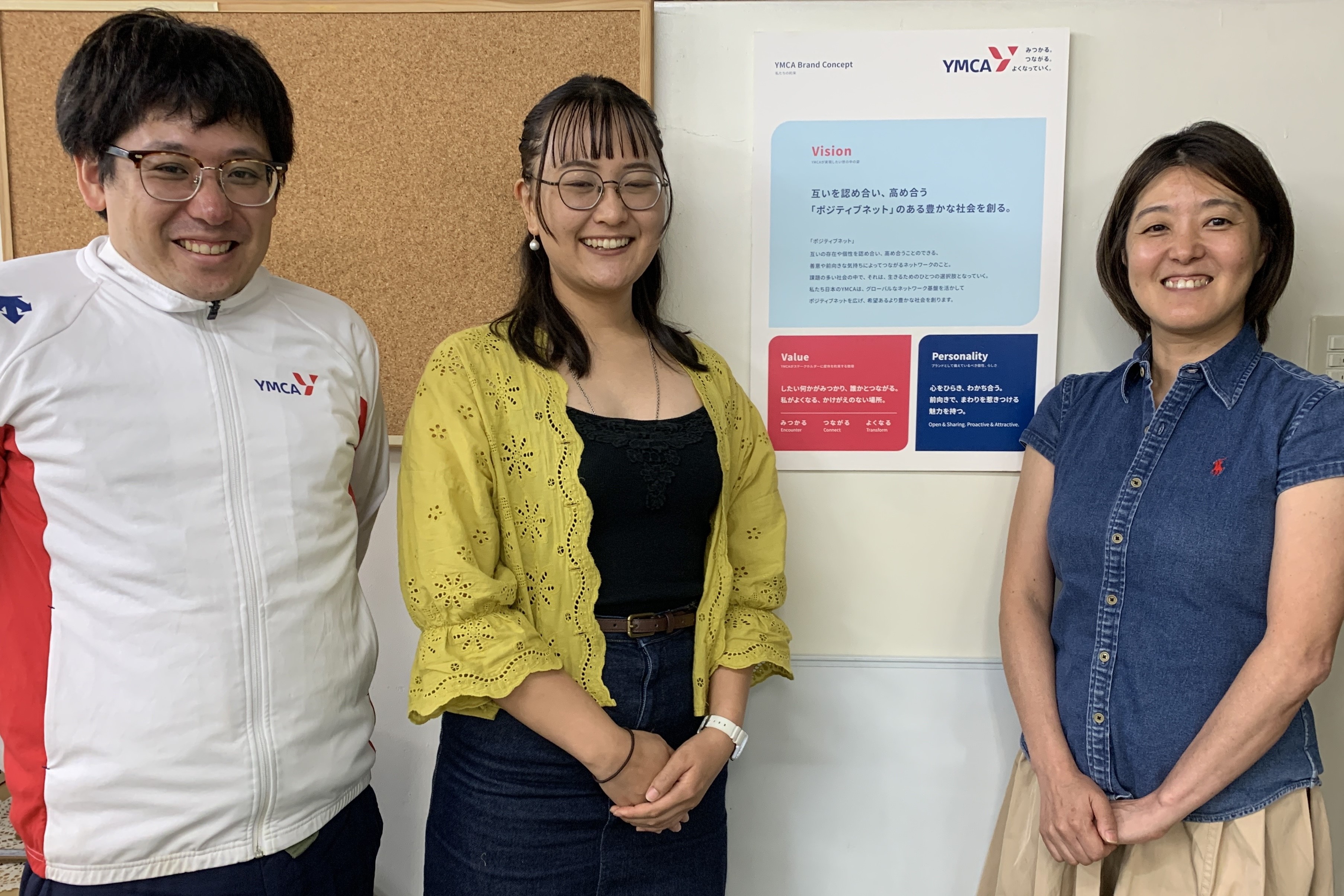
The YMCA was established in London in 1844. In 1880, the first YMCA in Japan, the Tokyo YMCA, was formed. The Tokyo YMCA has developed various programs, including language education, childcare, and international exchange programs. In April 2024, the Tokyo YMCA opened a "Multicultural Space ▽ (Sankaku)" - to support the creation of a place for children and youth - and has also begun new initiatives for children with foreign roots. We interviewed Ms. Akiko Ejiri and Ms. Akiko Oshiyama, who are in charge of the project.
The Multicultural Space ▽ (Sankaku), is a place for all, created by everyone who "participates (sankaku)" in the project.
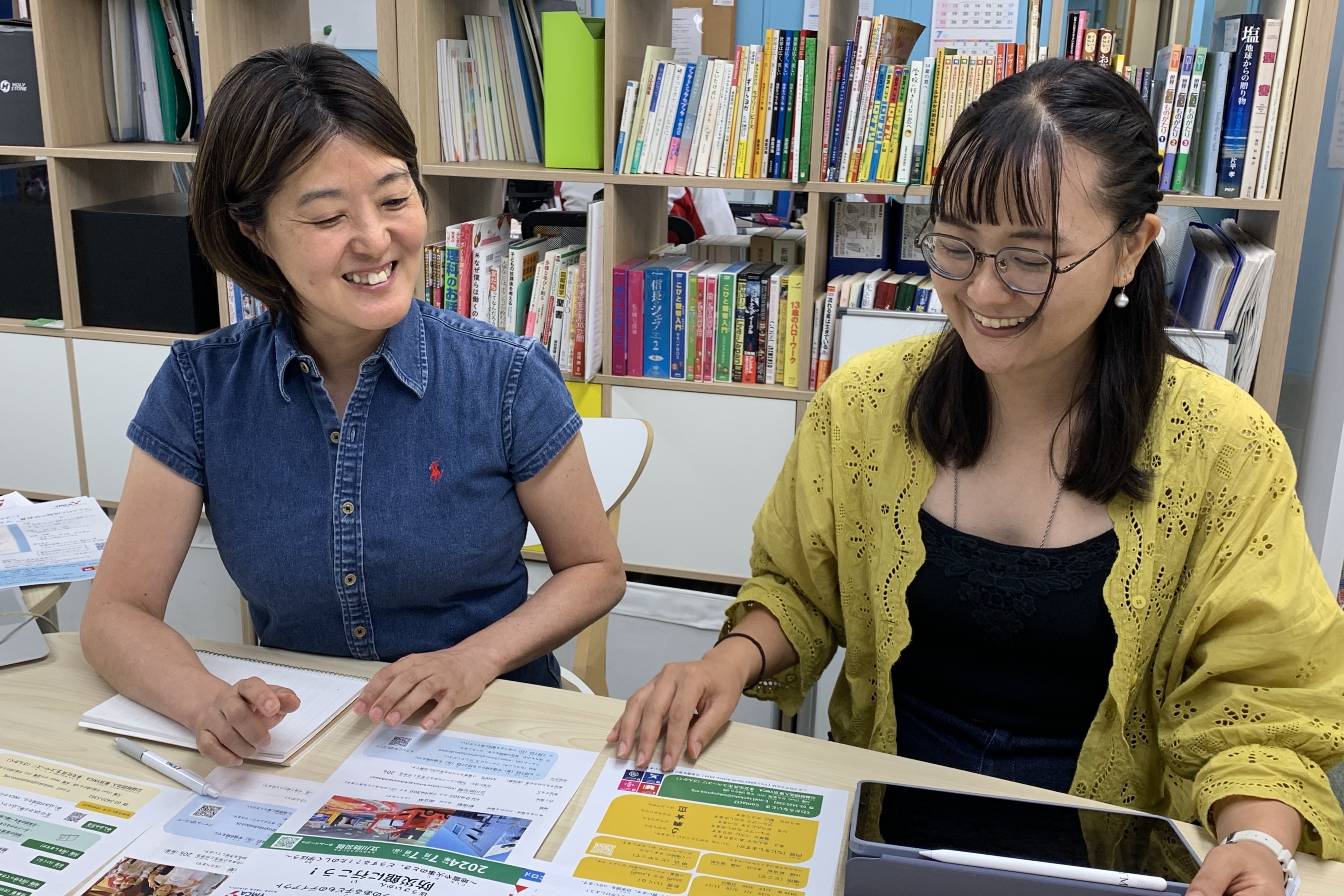
The Multicultural Space ▽ was started as a space-creating project of the Tokyo YMCA's Community Welfare Department. One of the bases for this project is located at the Minami (South) Community Center in Kyodo, Setagaya Ward, Tokyo. For some time, the Tokyo YMCA has been providing learning support for children with developmental disabilities here at the Minami Community Center and has also been providing a place for children who refuse to go to school. In addition to the support for people with disabilities and young people with some degree of difficulty in their lives, the Multicultural Space ▽ now includes support for children with roots in foreign countries. The Multicultural Space ▽ aims to create a safe and comfortable space for children and young people and to develop programs that enable them to feel the joy of connecting with others.
The Tokyo YMCA has always connected with other YMCAs overseas and operates Tokyo YMCA Nihongo Gakuin in Japan. The project for children with foreign roots was born out of the "expectation" that more could be done by taking advantage of the YMCA's connections, and the "challenge" of exploring what they could do in the local community.
"The name 'Multicultural Space ▽' (sankaku = triangle) reflects the YMCA's triangle, which is the official mark of the YMCA, and its wish for balanced growth of spirit, mind, and body, as well as the time, space, and friends that children need, in addition to the hope that those who come to this space will 'participate (sankaku)' in programs to help others and create this place together," says Ms. Ejiri.
"Sunny Side" ‐ Japanese language support for children with foreign roots.
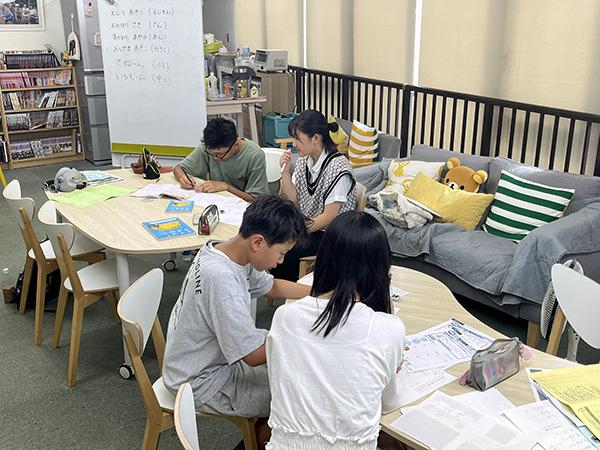
🄫Tokyo YMCA
The Multicultural Space ▽ currently provides - "Otonari San," a space for elementary school students' study support, "Meal Club," a space for young people with some manner of difficulty with their lives, "en × joy (en-joi)," leisure programs for people with disabilities, and "Sunny Side," study and Japanese language support for elementary and middle school students with foreign roots.
Sunny Side is one of the programs that the Multicultural Space ▽ started last year and is held at two locations: Multicultural Space ▽ in Kyodo and the Hitotsubashi University YMCA Hall, in Kunitachi City. "Once a week, we work with volunteer college and high school students to provide Japanese language support for children with foreign roots. Each time, we decide what to do by discussion. We try to divide the time between study time and activity time such as shopping games and playing cards, so that children can learn Japanese while having fun," says Ms. Ejiri.
A boy in the first grade of elementary school from China came to Japan last October. He has been studying Japanese hard at school and at home since then, and is now able to communicate to a certain level. There was a time when he did not want to speak Japanese because his friends at school told him that his Japanese was strange. But, as a volunteer high school student talked to him and drew pictures with him to deepen their relationship, he gradually began to open up to others. "His mother told us that she was happy because he seemed to enjoy going to Sunny Side, and speaking Japanese."
Sunny Side's program has just started but, little by little, positive changes seem to be happening among children.
Children's Expressions that can be Seen at a Camp Surrounded by the Great Outdoors
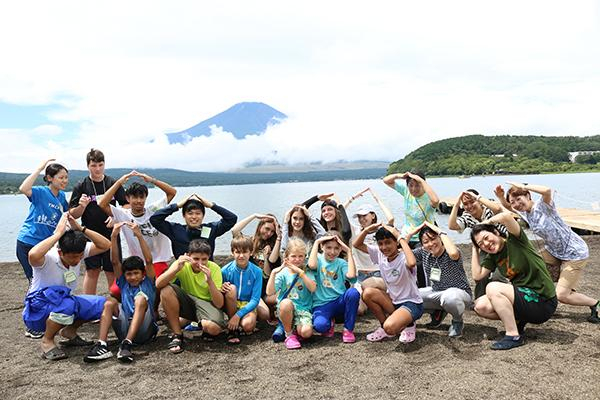
🄫Tokyo YMCA
The Multicultural Space ▽ has been holding summer camps since last year. Last year and this year, the Tokyo YMCA invited elementary and middle school students living in Japan with foreign roots to a free camp program to celebrate the campsite's 100th anniversary. This was the first program planned at the Multicultural Space ▽. The summer camps are held for three days and two nights, and provide an opportunity for children with foreign roots living in different parts of Japan to connect. Last year, children from the Kanto region with roots in various countries, including Ukraine, China, Nepal, and Korea, participated in this program.
"Last year, many of the participants could not speak Japanese. Even though the children had never met each other before, they immediately played together with a ball, and I felt that language does not matter," says Ms. Ejiri.
At camp, six to eight children and two volunteer leaders stay together as a group. Children can choose what activities to do; canoeing, boating, crafts, hiking, and others during the day. And then they have a campfire at night.
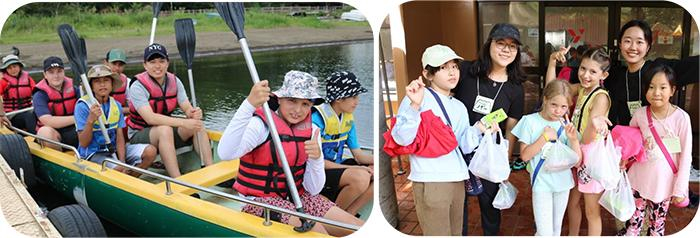
"Some children may behave differently from their usual selves because they know that camping is an extraordinary experience and they know it will come to an end. Children who have trouble getting along with their friends or showing themselves to their friends at school may be able to be themselves during the camp. I think the camp is an opportunity for these children to take on various challenges," Ms. Ejiri recalls. This year's camp received more applications than it could accommodate.
As for the future of the Multicultural Space ▽, Ms. Ejiri says the following, "Our ultimate ideal is for both Japanese children and children with foreign roots to be able to spend time together. We also offer summer camps for Japanese children. So, we would like to start by having Japanese children, and children with foreign roots, try one of the programs together during the camp." The Tokyo YMCA is also planning to raise donations through crowdfunding to continue the camp program in the next year, and beyond.
Creating "hands-on" opportunities to go out with peers on trains and buses.
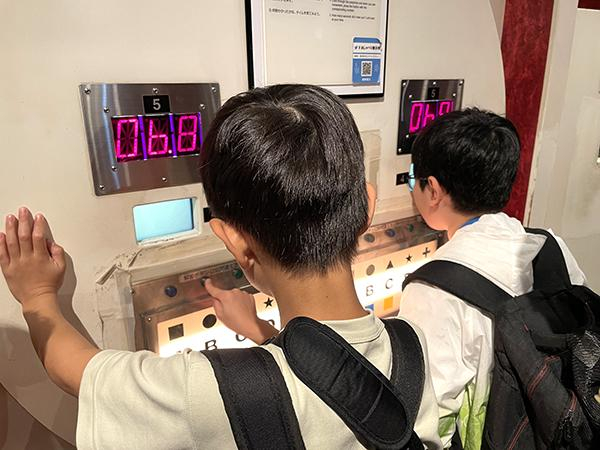
🄫Tokyo YMCA
This year, the Multicultural Space ▽also started a day out program for children with foreign roots, "MIKKUSU!
Once every two months, participants meet at Shinjuku or Kunitachi station, and go out together by trains and buses. This program aims to deepen participants' understanding of Japanese culture and the environment while they enjoy themselves; from how to use public transportation, to common etiquette. Children went to the Tama Rokuto Science Museum for the first session, and the Tachikawa Life Safety Learning Center for the second session. "We look for places that offer experiential learning when we decide where to visit. Participants may need language assistance since the program is held in Japanese. However, we hope that participants would be able to discover something by going out with friends from similar backgrounds, and learn at least a single new Japanese word at the sites they visit," says Ms. Oshiyama, who is in charge of the program.
🄫Tokyo YMCA
MIKKUSU! is a program born from the feedback of student volunteers who participated in summer camp last year. They said they wanted to provide children with opportunities to experience not only through a camp that takes place once a year, but through a constant program. What encouraged them to start the project were the voices of parents of children with foreign roots, as well as the voices of the supporting organizations and Japanese language class volunteers which YMCA staff visited before starting the Multicultural Space ▽.
"'I want my child to experience going out on a train with other children in similar situations, using Japanese, and paying for things by themselves.' 'Many volunteers in the supporting organizations are elderly, and it is difficult to create opportunities for children to experience going out. Isn't the YMCA good at this?' We got these suggestions. We decided to give it a try, since there was a need."
They have done two "MIKKUSU!" events, but they feel that there are difficulties too.
"We set the meeting place at Shinjuku and Kunitachi station, but in talking with parents, it seems that some of them have difficulty getting there in the first place. Some families have lived in Japan for a long time but have never been on a train because they mostly travel by bicycle or car. Or, some parents are working during the day and it is difficult for them to drop off and pick up their children. We need to consider changing the meeting place, or providing transportation support from the nearest station to the meeting place, so that these families can also participate," says Ms. Ejiri.
Aiming to be a space that creates multicultural and heartwarming connections with others
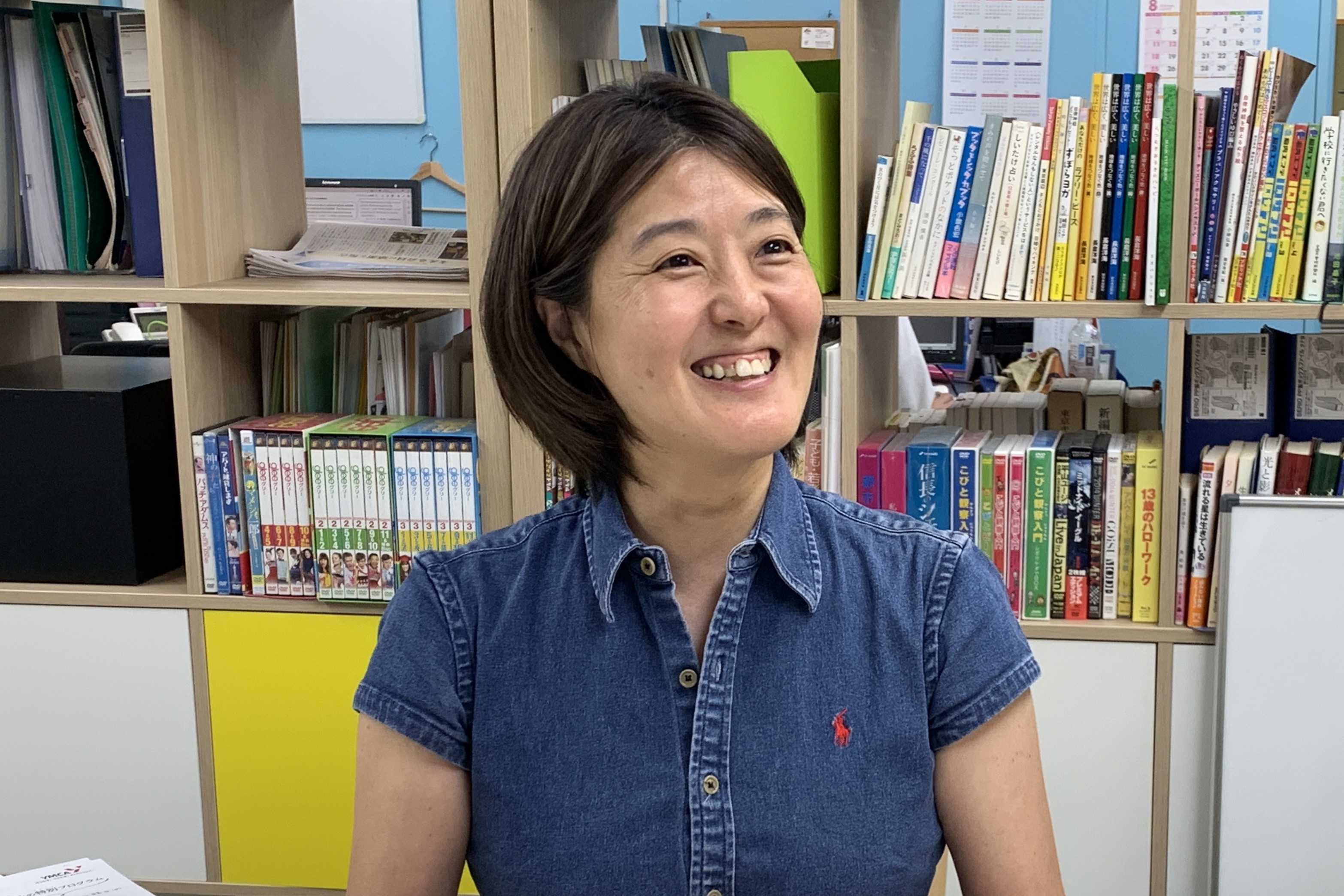
Although Multicultural Space ▽ has just started its programs, the experience and know-how gained from the Tokyo YMCA's past programs targeting various subjects are said to be very useful.
"Our method of conveying information in an easy-to-understand way to children with disabilities and the elderly is similar to the way we convey information to children with foreign roots who do not understand much Japanese. This is something we have noticed as we proceeded with our programs. Regardless of the person in question, we care about every one of them. It is important in all of our programs to draw out from the person what they want and what they would like to do, and to be there for them," says Ms. Ejiri.
Lastly, we asked Ms. Ejiri and Ms. Oshiyama about their thoughts on the future of the Multicultural Space ▽.
"For example, in the case of children with foreign roots, they have a common experience of coming to a place (Japan) where they cannot understand the language. We hope that (Multicultural Space ▽) will become a place where people can do things with others who have similar experiences and backgrounds, and where they can form relationships and connections that allow them to share their life experiences and everyday problems. We wish that both those in need and those who support them, will be connected to our programs, and that this warm community will expand to include as many people as possible," says Ms. Oshiyama.
"We now have different targets and are working on various programs. However, I believe that ‘multiculturalism’ means that we should all live together - including children with foreign roots and people with disabilities - while each of us has a unique culture. Ultimately, it is our ideal that people from all walks of life will be able to experience things together. Also, figuring out how to deliver information to those who need it is our major challenge for the future. First, we must get what we are doing on track, and then we would like to create a comfortable place where every one of us can be ourselves," says Ms. Ejiri.
We look forward to seeing what the Multicultural Space ▽ becomes in the future.
